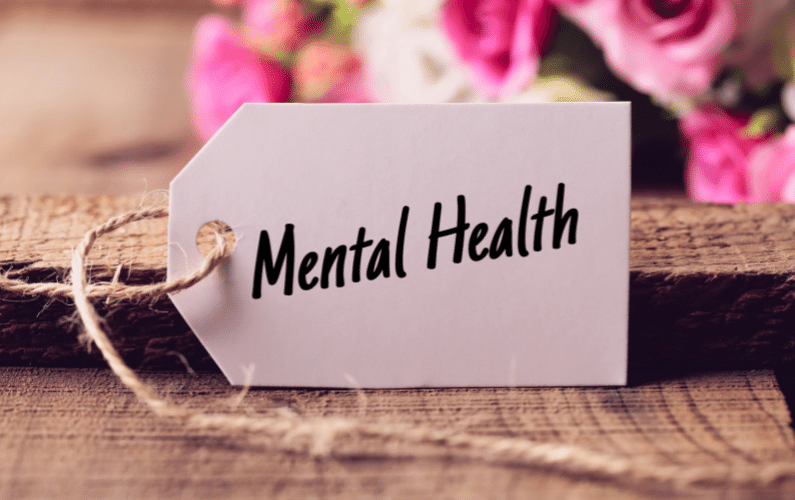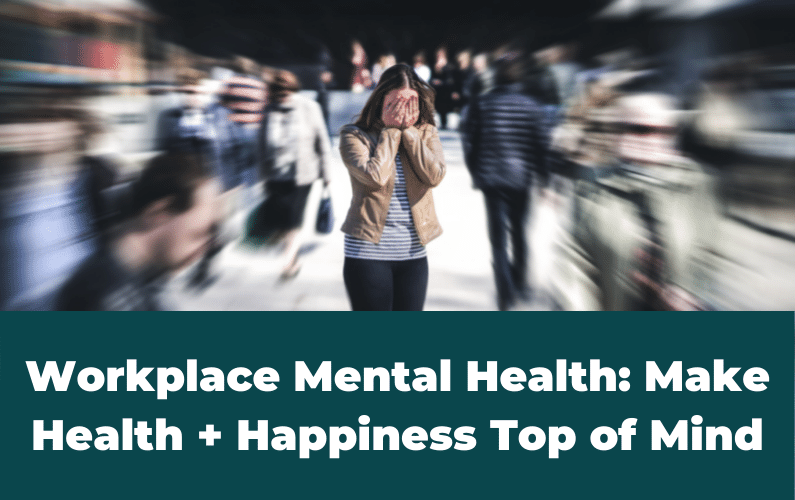Knowing how to maintain your workplace mental health is an essential skill that will have long-term career benefits. Now more than ever, mental health is a critical conversation that everyone needs to be having. And yes, this still applies if you’re working from home.
What is Mental Health

The World Health Organization (WHO) defines mental health as
“…a state of well-being in which an individual realizes his or her own abilities, can cope with the normal stresses of life, can work productively and is able to make a contribution to his or her community.”
Your mental health affects how you function physically, cognitively, emotionally, and socially. That covers just about every aspect of your life! If that doesn’t tell you it’s essential, I don’t know what will.
There are many different symptoms of mental health changes and potential mental health problems, so it is critical to know how extensive these disorders can be. And just to clarify, your mental health is not just a personal issue—it can have devastating effects on your career if left unchecked.
Please note: Though I’ve made a sport out of Googling medical conditions on WebMD, I’m not a doctor. If you’re concerned about your mental health, please seek medical professional help and resources.
Physical Signs of Mental Health Problems:
- Frequent stomach pain, back pain, or headaches
- Fatigue and trouble sleeping
- Change in appetite or eating habits
- Change in sex drive
Emotional Signs of Mental Health Problems:

- Extreme mood swings, highly reactive to circumstances
- Feeling low, sad, or deeply depressed
- Quick to anger, easily frustrated
- Strong feelings of fear or guilt
Cognitive Signs of Mental Health Problems:
- Easily confused and unable to concentrate
- Frequently forgetting important information, tasks, or events
- Out of touch with reality and intense paranoia
Social Signs of Mental Health Problems:

- Withdrawl from friends and family
- Disinterest in social events or outings
- Difficulty relating to others, lack of interest or empathy for others
While this is far from an exhaustive list, it does give you an idea of what mental health problems may look like in their various forms. It also shows you how serious some of these conditions can be, especially if you’re not receiving support.
Why You Need Workplace Mental Health
Strictly from a workplace perspective, mental health plays a massive role in how you cope at work, which affects your performance. If you’re serious about building a satisfying career, then mental health has to be a top priority for you. This is even more true if you’re after a high-powered career such as one in Law or Medicine.
Stress inevitably comes into the workplace whether you’re working in an office or working from home. If you don’t figure out how to deal with it effectively, you may find yourself dealing with lasting consequences.
When you ignore workplace mental health, you’re exposing yourself to several risks.
Making Mistakes

Feeling burnt out? You’re not alone; many people feel the effects of being mentally overwhelmed. According to Employee Benefit News (EBN)
“Pre-COVID-19, 68% of women reported suffering from burnout…Since the start of the pandemic, more than 70% of female employees have experienced burnout in their jobs, and 62% have taken a day off strictly due to stress…”
Issues in the workplace arise when you ignore the signs and symptoms of mental health problems because you’re more prone to making mistakes. Don’t get me wrong; mistakes happen even when we’re at the top of our game. But, the mistakes you make when you’re burnt out and overwhelmed are usually more detrimental to your reputation and career.
One of the most common mistakes is losing your attention to detail. For example, I once had a candidate who looked perfect on paper. Her resume was excellent, and she was a match made in heaven for the role I was recruiting. When I called her, she interviewed well, and I was convinced I had hit the jackpot with her. But when I presented her to the client, I found out she had a reputation of not paying attention to detail and making BIG mistakes.
Making Bad Decisions
Making bad decisions is heavily related to making mistakes, but you’re usually more of an active participant in making a bad decision. Bad decisions can be made for several reasons. When it comes to reasons related to mental health, depression and anxiety are the most common culprits.
I’m not saying that people with diagnosed conditions like depression and anxiety will always make bad decisions. I am saying that untreated and unsupported depression and anxiety are more likely to lead to bad decision-making.
For example, I’ve had candidates—and personal friends of mine—call in sick for work repeatedly. While this isn’t strictly a mental health issue, it is a red flag. And, it’s a bad decision. Both my candidates and friends were eventually let go because of an excessive amount of missed workdays.
Having Emotional Outbursts

Emotions happen and all of us experience them. But, emotional outbursts (especially in inappropriate situations) can be detrimental to your career.
The reason why these outbursts can have such a detrimental effect is that they reveal your ability (or inability) to cope with stressors. If you break down every time you face a challenge at work, you may be overlooked for promotions because your managers might think you can’t cope with the added stress of a higher-level position.
Beyond career progression, I’ve also heard of candidates losing their jobs over emotional outbursts. Thankfully, none of my candidates have ever done this, but I’ve heard of candidates losing their tempers, and walking off the job. When they try to return, they’re sent home and told that they are fired effective immediately. Yikes.
As you can see, recognizing your workplace mental health is essential for career growth. You need to function at your best to move forward in your career and that means taking care of yourself and seeking treatment when you need it.
How to Make Your Health + Happiness a Priority
Stress is unavoidable at work, and it has a significant impact on workplace mental health. Whether you are working from the office or working from home, pressure will inevitably find its way into your daily life. And while you can’t avoid it, you do need to find a healthy and effective way to manage it.
Do Your Research
The first step of managing your mental health is to be well-informed on what it is and what it looks like. There are extensive resources on the web including WHO, government sites, and not-for-profit organizations. By educating yourself, you give yourself the tools you need to recognize your own mental health challenges as well as challenges others may be facing.
Being informed doesn’t just protect you in the workplace, it actually makes you a better team member. You can show off your leadership skills by being an active advocate for mental health and embodying exemplary self-care.
Seek Treatment

Treatment includes a wide variety of health programs including therapy, counseling, and prescribed drugs. You can take the approach you’re most comfortable with or combine therapies. There is no one-size-fits-all solution.
Seeking treatment involves a lot of trial and error. You’ll need to take it slow, try different things, and be patient. Give your chosen methods time to work. Don’t give up on them too early.
Build a Support System
Having a reliable support system in place is important. Friends and family are great options for day-to-day support., but it is also helpful to have a support system in place at work.
People at work understand the pressures you’re under and can relate to your unique challenges. They are more likely to give actionable advice that makes sense for your specific work environment. At the very least, they can make you feel seen and heard in ways that people outside your workplace can’t.
I have an incredible support system at work. Whenever I’m feeling stressed or just down because things aren’t working out, there are key people I seek support from. Who I rely on depends on what type of support I’m looking for, but I always know who I can go to when I need help.
Set Boundaries

I’m going to be completely honest with you. I still struggle with setting boundaries for myself at work. It’s a learning process and it’s not always easy (especially if you’re in a competitive field like recruitment!)
Boundaries are vital. You need to protect your time and your mental health. Setting boundaries means showing up and leaving work at reasonable times, not working every evening or weekend, and taking your scheduled breaks.
It could also mean drawing the line when it comes to how many tasks you’ll take on at a time, how often you assist others with their work, or how long you work on stressful tasks.
Take Effective Breaks
Taking breaks is an important part of any mental health strategy. You should be taking your scheduled breaks (because you’ve set that boundary, right?) But you also need to ensure that the breaks you’re taking are effective.
Having helpful strategies in place is a game-changer. Some great resources and strategies include:
- Taking short breaks throughout the day to meditate using apps like Headspace or Calm
- Taking a walk, outside if possible
- Eating a small, healthy snack or a full, healthy lunch (Girl on Bloor is one of my favorites for lunch recipes!)
- Be social with co-workers and try to engage in conversations that don’t revolve around work
Limit Your Caffeine Intake

I can hear the collective grumble of coffee lovers everywhere. But did you know that caffeine (especially in excessive amounts) triggers feelings of anxiety? So if you’re feeling worked up and on edge, it might be a good idea to limit your caffeine intake.
Another sign you might need to limit your caffeine is frequent stomach issues. Anxiety and excessive acidity (e.g., coffee) can lead to conditions such as stomach ulcers. If you’re experiencing stomach pains often, consult with a doctor and consider switching to decaf.
Not going to lie; this one is hard for me as well. I love a strong cup of coffee. But when I first discovered that caffeine was likely triggering my anxiety, my colleague introduced me to a whole new world: loose leaf tea that went beyond your basic Orange Pekoe.
Tea is a great option if you’re looking to lower your caffeine intake or cut it out completely. It takes some time, but eventually, it’s just as satisfying as coffee—if not more so.
Here is a list of my favorite teas from DAVIDsTEA:
- David’s Organic Detox
- The Skinny Organic
- Buddha’s Blend
- Mother’s Little Helper
- After Dinner Mint
Maintain a Healthy Lifestyle Outside of Work

I’ve found that maintaining a healthy lifestyle outside of work makes a massive difference in how I feel and how I perform at work. I know things like exercising and eating healthy can feel like added burdens when you’re strapped for time, but they are so, so important.
A healthy diet and a well-rounded exercise routine help combat mental health problems and give you an outlet for feelings of frustration or anger. They also keep your hormones in check which helps with symptoms of depression and anxiety.
If going to the gym is not for you, there are a lot of great apps that help you get what you need in the time you have available. My personal favorites are the Sweat app and FitOn. Achieving your fitness goals just got a whole lot easier; trust me!
When you’re getting what your body needs, you’re able to function at your best. And when you’re functioning at your best, you’re able to kill it in the professional arena.
Final Thoughts on Workplace Mental Health
Workplace mental health is more important now than ever; we have to do everything we can to take care of ourselves. That means making time for ourselves and realizing that mindfulness has to happen at work as well.
Remember:
- Educate yourself on the warning signs and symptoms of mental illness
- Seek treatment as soon as you recognize you’re struggling with mental health challenges
- Build a reliable support system that is a mix of friends, family, and co-workers
- Set boundaries and give yourself permission to relax
- Take effective breaks that allow you to step away from work
- Limit caffeine intake if you’re struggling with stomach issues or anxiety
- Maintain a healthy lifestyle outside of work through exercise and a balanced diet
How do you prioritize your health and happiness at work? Let us know in the comments!

